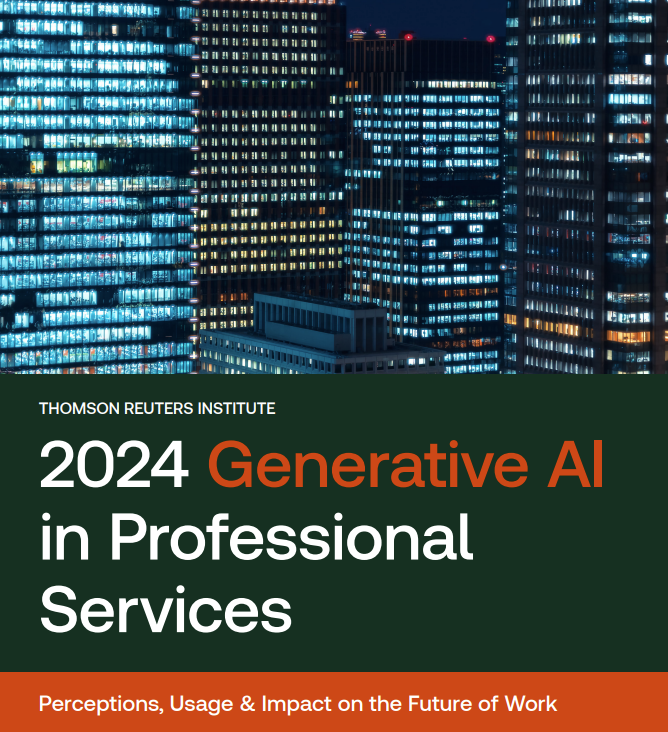Generative Artificial Intelligence (GenAI) is beginning to manifest itself in corporate tax, presenting both advantages and concerns. As a transformative technology capable of generating human-like text, code, and other creative content, GenAI is posed to reshape the tax landscape.
Understanding the shift in GenAI adoption
The desire to use GenAI in corporate tax has seen a significant shift. In 2023, the majority (73%) of tax professionals did not have any immediate intentions to use GenAI. However, in 2024, this percentage decreased to 48%, indicating a significant shift in their perspective towards this groundbreaking technology. The 2024 Generative AI in Professional Services report highlights this trend, emphasizing GenAI’s potential to transform corporate tax practices.
 |
2024 GenAI in Professional ServicesDiscover perceptions, usage, and impact on the future of work
|
Corporate tax departments are starting to explore using GenAI for several reasons:
- Increased efficiency and reduced costs. AI can automate many time-consuming tasks like data entry, document classification, and basic calculations. This frees up tax professionals to focus on more strategic work and reduces the risk of human error.
- Improved accuracy and compliance. AI can analyze vast amounts of data to identify potential tax risks and ensure compliance with complex regulations. This helps companies avoid penalties and fines.
- Enhanced tax planning and decision-making. AI can analyze historical data and emerging trends to provide insights for tax planning and optimization. This allows companies to minimize their tax burden and maximize their profitability.
- Proactive approach to tax management. AI can identify areas for potential tax savings and suggest strategies to take advantage of them. This proactive approach allows companies to stay ahead of the curve and manage their tax liabilities effectively.
- Talent shortages and skill gaps: The tax profession, in general, is facing a shortage of skilled professionals. AI can help bridge this gap by automating routine tasks and providing support to junior corporate tax professionals.
While GenAI is still in the early stages of adoption within corporate tax, its potential benefits are significant. This is why many tax departments are exploring its use and implementing pilot programs to see how it can improve their operations.
Developing AI literacy
As corporations start to embrace GenAI, it becomes important for businesses to develop AI literacy among their employees. This involves fostering a comprehensive understanding of the capabilities, limitations, and ethical implications of AI technologies. To effectively use GenAI in their roles, employees must have the necessary knowledge and skills. This will allow them to make informed decisions and fully leverage the technology’s potential.
To achieve AI literacy, corporate tax departments should consider implementing these key strategies:
- Provide comprehensive training programs that equip employees with the fundamental knowledge of GenAI technologies. These programs should cover topics such as the underlying principles of AI, its various applications, and the potential benefits and risks associated with its use. Additionally, hands-on experience with GenAI tools and platforms can help employees gain practical understanding and confidence in using the technology.
- Foster a culture of ongoing learning and exploration. This involves providing employees with resources such as online courses, workshops, and seminars to stay updated on the latest advancements in GenAI. Companies that value curiosity and innovation can empower employees to find new opportunities and creative uses for Generative AI to improve performance and decision-making.
Strategic integration of GenAI
The strategic integration of GenAI can transform corporate tax functions. Seamlessly integrating GenAI into existing tax workflows and systems is vital for maximizing its impact. This involves developing APIs, connectors, or custom integrations to enable data exchange between GenAI applications and existing tax software or systems. Integration should be designed to minimize disruption to current processes and ensure a user-friendly experience for the corporate tax team. Corporate tax departments need to consider the following:
- Identifying and prioritizing tax tasks and processes that align with GenAI capabilities is crucial. GenAI excels in tasks that involve analyzing large volumes of data, automating repetitive processes, and generating reports. Tax departments should assess their workflows and identify areas where GenAI can improve or replace manual processes, enhancing efficiency and accuracy.
- Establishing a strong data governance framework is crucial for the successful adoption of GenAI. High-quality, well-structured data is vital for the functioning of GenAI models. Businesses need to enforce strict data collection, management, and cleaning procedures to guarantee the precision and dependability of outputs produced by GenAI. In addition, appropriate data security protocols must be implemented to protect sensitive tax information.
- Developing and implementing a comprehensive GenAI implementation plan is essential to ensure a smooth integration. This plan should outline the specific objectives, timelines, responsibilities, and resources required for successful GenAI deployment. It should also address potential challenges and mitigation strategies. Clear communication and stakeholder engagement throughout the implementation process are crucial to gain buy-in and ensure a successful transition.
- Establishing a continuous monitoring and evaluation process is crucial to ensure the ongoing effectiveness of GenAI implementations. Regular evaluations of GenAI-generated outputs, along with user feedback and key performance indicators (KPIs), are crucial for pinpointing improvement areas. This ensures that GenAI stays in sync with changing tax regulations and business needs.
Data, ethical, and corporate cultural considerations
The emergence of GenAI in corporate tax functions brings forth a range of ethical and cultural considerations that businesses must carefully address. One key concern lies in the potential for bias in data and algorithms. GenAI systems are trained on vast datasets, and if these datasets contain biases, the resulting AI models may perpetuate and amplify those biases.
Data privacy and security are paramount when dealing with sensitive tax information. GenAI systems process vast amounts of confidential data, making robust data governance practices essential. Businesses must implement stringent security measures to protect sensitive information from unauthorized access, breaches, or leaks. Failure to do so could result in severe legal, financial, and reputational consequences.
Responsible AI development and deployment are crucial to ensure the ethical use of GenAI in corporate tax functions. Businesses should establish clear ethical guidelines and principles for AI development and deployment. These guidelines should address issues such as data privacy, transparency, accountability, fairness, and human oversight. By promoting responsible and ethical practices, businesses can mitigate potential risks and build trust among customers, stakeholders, and the public.
Lastly, the corporate cultural implications of GenAI cannot be overlooked. The introduction of AI into tax processes may challenge traditional ways of working and decision-making. Businesses must foster a culture that embraces innovation, encourages experimentation, and values human-AI collaboration.
 |
2024 GenAI in Professional ServicesDiscover perceptions, usage, and impact on the future of work
|










